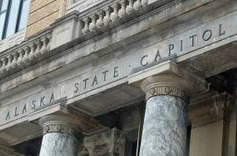
There will be a fourth special session of the Legislature Oct. 23 and it will deal with taxes, according to a memo from Governor Walker’s legislative director.
Darwin Peterson contacted all 60 legislators with this note:
Dear Legislators,
I hope you’re all having an enjoyable interim and getting lots of quality family time. There has been a lot of talk about a special session in October. It has been and remains the Governor’s intent to call the Legislature into a special session this fall on the subject of revenue. The Governor has talked to both the Senate President and the Speaker about timing for a special session and has settled on Monday, October 23rd as the best time to convene the Legislature in Juneau for the 4th special session. An official proclamation will be forthcoming, but I wanted to give you all as much notice as possible.”
House Minority leader Charisse Millett responded: “I appreciate the Governor giving us a long lead time for his 4th special session call, however, if the Governor is advocating for new or increased taxes on Alaskans, and Alaska businesses. I believe the 4th special session will not have a positive outcome. We still need to have a honest conversation about the size of government, and continue to make smart reductions, and eliminate wasteful spending before reaching in Alaskans wallets.”
The session is scheduled for immediately following the Alaska Federation of Natives annual convention in Anchorage, which ends Oct. 21.
The governor is likely to bring a sales tax proposal to the Legislature since his income tax proposal failed during regular and special sessions earlier this year.
House Majority Leader Bryce Edgmon welcomed the opportunity to work on taxes:
“The facts are that low oil prices are likely for the foreseeable future and we currently have less than one year’s worth of savings to fund essential state services like public education and public safety. That means it is time for all of us to put aside politics and come together to find a sustainable fiscal solution for Alaska,” the Democrat from Dillingham said. “The members of the Alaska House Majority Coalition are prepared to go back to work to finish what we started earlier this year when we passed a full fiscal plan that included new revenue to fill the budget gap. I am concerned that if action is not taken this fall the politics that inevitably spring up during an election year will get in the way of real and comprehensive fiscal solutions next year.”
However, there are billions of dollars in reserves that could hold the state for years to come if the governor would trim the budget. He has been unwilling to make those cuts and has sought higher taxes since taking office in 2014.
